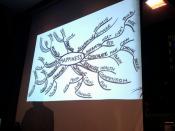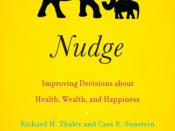To live a happy life is one of the most basic and popular goals that people have for their life. Yet when we say we want to be happy do we really understand happiness and its differing definitions. In the Gorgias, Callicles disagrees with what Socrates considers it takes to be happy. Just as each individual has different ideas about what happiness entails. Life includes many attributes; having wealth and power, fulfilling appetites, desirable personal characteristics, and pain and pleasure. To be happy we must live in the thin line between being excessive and not needing anything. A person's basic desire is to have the attributes but keeping our wants in moderation is the key to happiness and in addition your happiness should not interfere with anyone else's happiness.
First, let us try to dissect one of the biggest attributes that people consider when they talk of happiness, wealth and power.
A first instinct when you ask a person about their happiness or what it would take for them to be happy would be to say that they would want the power to rule over people as well as wanting all the wealth in the world. But looking at this thought more closely we quickly realize that this would not necessarily be a good thing. Would you want to have the power because you gained it through violence or fear? Would you welcome the fact that someone had to die, be injured whether physically or emotionally for you to gain or maintain that power? The answer is no, you would not have wanted to gain power through these means. A person would not want to have power at the expense of another person's suffering. The guilt at having caused harm to another person would make it utterly impossible to be happy. The very thing you did to gain power would cause you to suffer.
At the same token if you gained that power through unjust means you would always be expecting some recourse for you actions. Revenge is a powerful emotion and people will go to extreme measures to avenge where they think they have been wronged. Would a person want to live their life knowing that from the same source where they gained their power, a possibility for revenge lurks? Could you rest knowing that you and your family were in danger constantly? No, you would not want to live your life under these circumstances. An individual could never rest because they always have to be ready to defend their power. Being on constant alert certainly does not sound like the recipe for being happy. Power can only be good when a person gains it through the right means, without insult or injury to anybody else. Where everybody respects them and is content with them having power.
Some of these same thoughts go with having wealth. Would you want to have wealth because you took it from somebody else? Would you want wealth knowing the other individual is doing without? No, person could not be happy under these circumstances. An individual could not live a happy and normal life knowing that because they have wealth somebody else does not have the financial means to eat or to provide shelters for themselves or their family. Wealth is a tricky thing to have. Whereas you want the wealth to provide for you and the people you care about, you do not want to have to provide for everybody in the world. You would not want so much that people would have an extremely less amount and would expect you to provide for them. Based on these observations it can be reasoned that wealth would only be good if it is positive and your wealth did not take away from another person.
Second, another thing considered big in happiness is the fulfillment of appetites. At first glance, you might think that to be the happiest you would like to be able to fulfill your appetite with whatever you want and as much as possible. But would you want to fill yourself with unhealthy foods? No, because obviously you would know that doing so could cause major health problems such as obesity, heart disease, diabetes, etc. Health problems do not equal a happy life. Hospitals, doctor visits, and medications are something we try to avoid and definitely do not label as a happy or pleasant experience. On the same line of thinking you would not want to fulfill your appetite with drugs. Drugs can lead to addiction which will definitely cause health problems as well emotional and financial problems. Not being able to lead a productive life is not a way to maintain a happy lifestyle.
On the other hand, a person would not want to be constantly guarding what they could eat and how much of it. To always have to monitor your food intake or alcohol consumption would be nerve wrecking. Always having to be serious without having any fun can lead to emotional stress in itself. Letting loose is a release that a person needs to have in their life. Having things built up in you is unhealthy. Having an excess of something can be unhealthy. A balance must be met to where you can maintain a healthy, safe, fun, and adventurous lifestyle.
The third thing considered to be important concerning happiness is desirable personal characteristics. People might consider wantonness, lack of discipline, and freedom to be excellence and happiness. Now on the surface not being disciplined, having no restraint and freedom are all things that we have wished for in our lifetime. At a very early age, we are subjected to different amounts of discipline by our parents. We are very troubled by this and from the onset a basic wish for our life to be happy is to not have any discipline. A person does not fully understand that discipline is a necessary evil until later in life. Discipline gives us structure in a structure less world. Without it would we understand consequences for our actions? Would we realize that without self-discipline we would be lazy and unproductive? Discipline is a good tool to use to help make sure that another is not subjected to our unreasonable actions. People have to understand that their actions can affect others. Discipline is only bad when it taken to an abusive level. Happiness is achieved between the two.
Restraint and freedom are opposite in definitions but to be happy you need the right level on both. As with discipline, if people had no restraint they would not care what did or how much of it. Restraint allows us to be happy as well as allows our fellow man to be happy. Someone is no going to be happy knowing that their not being able to control their actions has caused another person to be distressed. An individual needs to have restraint enough to allow freedom for another. Restraint should not be abused causing lack of freedom for self. Your freedom should not impede on anybody else's freedom; meaning that because you have freedom somebody else is not going to be happy. You should not use your freedom to bash another person's free right to their ideals. Having your beliefs disgraced by another's free right of speech is not going to make either person happy. One you have caused another person pain and this in itself will make you unhappy as well as that person being unhappy that their thoughts and beliefs are minimized. Therefore, discipline and restraint without abuse and freedom without interfering with others, contribute to excellence and happiness.
The last attribute discussed is regarding pleasure and pain. This seems like an easy one. Who would want any form of pain and who would not want all the pleasure they could get? Most people would consider that everything pleasant would be good. At the same time everything painful would be bad. These statements seem fair enough and we at first would agree that this would be true. Therefore, we should be happy if we have all pleasant things and nothing painful. However, as we look deeper into this we start to realize that this is not necessarily true. For instance, it might be painful to hear somebody tell you the truth about your bad breath. But would you be happy knowing that you were walking around with bad breath all day as well as the oral problems from not brushing. So in this sense we would want somebody to tell us not out of meanness but out of concern. Another example would be if we broke our arm, now it might be painful to get it fixed but would we want to continue living with a broken arm. This would certainly not make us happy. Pain can make us happy when it is good for you before and after.
Pleasant is not always good either. Would we want pleasant things to happen to us at the expense of others? Would we welcome the benefits without caring about another's pain? To be happy we would want things that are pleasant to us to also be pleasant for other people. As was the case with appetites, we would not want we be addicted to anything. Most people would agree that pleasant things can sometimes be addictive. As they say there is a reason for too much of a good thing. Pleasant only makes you happy when it is good for you at any level and it is not unpleasant for anybody else.
In conclusion, we have discussed a wide variety of attributes that we want and that majority agrees are the main causes for leading a happy life. But we realize it is not as basic and easy as we had first assumed. It is a very thin line between happiness and unhappiness as well as between excessiveness and not needing anything which is where you have to be in order to be happy. Wealth and power have are good when you achieved both in a positive way and by having them it does not take away from anybody else. Appetites must be balanced to where you can maintain a healthy, safe, fun, and adventurous lifestyle. Discipline and restraint without abuse and freedom without interfering with others, are key to contributing to excellence and happiness. Pleasant only makes you happy when it is good for you at any level and it is not unpleasant for anybody else. Pain can only make us happy when it is good for you before and after. We can conclude that the key to having happiness is to have the attributes listed as well as the limitations that come with it. Our basic desire for happiness can be achieved by keeping our wants in moderation and also realizing the fact that your happiness should not interfere with anyone else's happiness.
Plato, Gorgias. Donald J. Zeyl (Author, Translator) Hackett Pub.: 1986.





